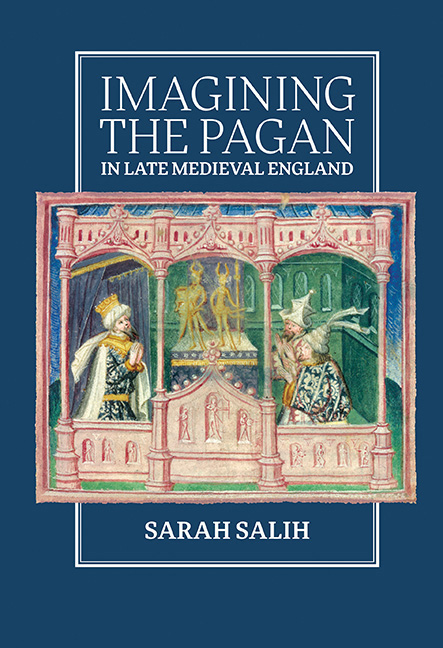4 - Coda: The Future
Published online by Cambridge University Press: 15 October 2019
Summary
Pagans are people who build a culture – cities, civilisations, religions, artworks – that they do not fully understand, that evades their control, of which they cannot retain ownership. Their material things outlive them and form relationships with new people. Paganity was never fully itself, but always pre-Christian: Christianity, likewise, is always post-pagan; but because the material structures are imagined to be constant, the two are contemporaneous as well as successive. Supersession is incomplete; pagan traces persist. The richness of paganity as a topos is not unlike the richness of the medieval to modern writers: it is something that can be imagined as both familiar and strange, accessible and distant. As Grady writes:
Medieval writers looked to a pagan past that was both a part of their own history and theologically separate from it, because in looking back they found much to value; we moderns look to a medieval past whose fundamental alterity we cannot help but recognize, but that appeals to us for reasons analogous to those medieval motives: their history is a part of our history, and their cultural products – from the aesthetic to the political and economic, and including the theological – continue to have value for us, continue to evoke our esteem and sense of indebtedness.
When we look back at the medieval looking back at the pagan, the medieval is both the object of study, but also a colleague, a fellow-enquirer into the ways of the past. In both cases, there is an oscillation between concepts of the past. On the one hand, it may be that which is gone, on the far side of a rupture, and which therefore does not matter. As de Grazia writes, ‘the medieval/modern divide determines nothing less than relevance. Everything after that divide has relevance to the present; everything before it is irrelevant.’ De Grazia, of course, writes to resist this epistemic rupture, and is one of several scholars to track the porosity of temporality; Carolyn Dinshaw, for example, focuses on ‘asynchrony: different time frames or temporal systems colliding in a single moment of now’. The current non-academic use of ‘medieval’, regularly decried by medievalists, to mark certain kinds of violence as someone else's, holds both positions in suspension: something medieval has erupted in the present, producing temporal heterogeneity – but its presence is illegitimate.
- Type
- Chapter
- Information
- Imagining the Pagan in Late Medieval England , pp. 173 - 178Publisher: Boydell & BrewerPrint publication year: 2019



